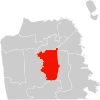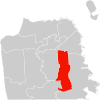San Francisco Proposition G (2024)
| Elections in California |
|---|
 |
On November 20th, 2023 the San Francisco Board of Supervisors passed a motion ordering the inclusion of Proposition G: Offering Algebra 1 to Eighth Graders on the March 2024 Local Ballot.[1] Written by Supervisor Joel Engardio, the measure acts as a non-binding policy statement urging the San Francisco Unified School District to reverse their decision on delaying enrollment in Algebra I until ninth grade.[2] If the ballot were to be passed, the decision to modify course offerings for students would not necessarily be changed. The San Francisco Unified School District is a public agency that is separate from the City and retains jurisdiction in regards to when Algebra I is able to be offered to students.[3] Passage of the proposal would inform the San Francisco Unified School District on the stance of the constituents in regards to their preferred math offerings for students.[2] Additionally, the proposal would: support the School District's development of its math curriculum for students at all grade levels, explore differentiation options for students both below and above grade-level in math across all grades, and promote pathways for students interested in studying STEM at the university level.[1]
Support[edit]
According to the Ballot Simplification Committee's digest for voters, written by members of the San Francisco Board of Supervisors, voting "YES" would make it City policy to encourage the School District to offer Algebra 1 to students by their eighth-grade year and to support the School District's development of its math curriculum.[1]
Joel Engardio, the author of the proposal, argues that delaying algebra until 9th grade penalizes math-loving students, limiting their ability to take advanced math coursework by high school graduation and hindering college options. [4] He believes that offering algebra in 8th grade will enhance public education, address declining district enrollment, and make San Francisco's public schools more competitive with private schools, ultimately benefiting the city's future by retaining families.[4] Engardio also highlights the unintended consequences of the current policy, such as its impact on college applications, and emphasizes the need for better teacher and staff pay to support successful algebra education.[4]
Additional support has been voiced by those that supported the 2022 San Francisco Board of Education recall.[5]
Opposition[edit]
According to the Ballot Simplification Committee's digest for voters, a vote "NO" means that "you do not want to adopt this as City policy."[1]
The lone supervisor voting against the measure, Shamann Walton, argues that the passage of the proposition does not address the challenges faced by students and teachers within the district. He states, "I don't like misleading the voters in making them think that we're putting something on the ballot that has any teeth or that actually does anything, because this measure does not do anything."[6]
Proposal cost[edit]
On December 11th, 2023, the San Francisco Office of the Controller wrote: "Should the proposed declaration of policy be approved by the voters, in my opinion, it would have no cost to government."[7] In effect, Proposition G is envisioned as a cost-neutral initiative, leaving the decision and implementation process of reintroducing 8th-grade algebra to the discretion of individual schools, offering flexibility to adapt the policy based on their unique circumstances and resources.
San Francisco Board of Supervisors vote[edit]
References[edit]
- ^ a b c d "Proposition G: Offering Algebra 1 to Eighth Graders | San Francisco". www.sf.gov. Retrieved 2024-02-14.
- ^ a b c City and County of San Francisco Department of Elections. "Official Motion" (PDF).
- ^ Schwartz, Sarah (2023-03-20). "San Francisco Insisted on Algebra in 9th Grade. Did It Improve Equity?". Education Week. ISSN 0277-4232. Retrieved 2024-02-14.
- ^ a b c "It's Time for San Francisco to Bring Algebra Back". San Francisco Supervisor Joel Engardio. 2023-09-26. Retrieved 2024-02-21.
- ^ Sumida, By Nami. "Who is supporting the S.F. Board of Education recall? Here's what the data shows". San Francisco Chronicle. Retrieved 2024-02-21.
- ^ Dickey, Megan Rose (February 21, 2024). "Bringing back eighth-grade algebra at San Francisco schools". Axoios.
- ^ Rosenfield, Ben (December 11, 2023). "OFFICE OF THE CONTROLLER, CITY AND COUNTY OF SAN FRANCISCO, Analysis" (PDF).






















